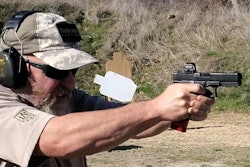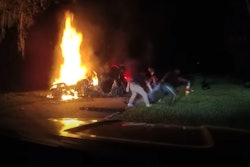For most Americans, today begins a much-anticipated three-day Memorial Day holiday weekend.
The holiday has its roots in our deadliest conflict Immediately following the Civil War. During the last weekend in May during the late 1860s people started making something of a pilgrimage to the many thousands of gravestones marking the final resting place of those who died in the 1861-1865 war. They said prayers and placed flowers. It was called Decoration Day.
Following the War to End All Wars, the name was unofficially changed to Memorial Day and was then said to mark all Americans who died in all wars. Little did they then know that a second world war would further fill the graveyards with fallen American soldiers.
Despite the solemnity of the occasion from an historical perspective, from a societal standpoint, for most Americans, Memorial Day is traditionally the unofficial start to summer—with parades, cookouts, and trips to the beach or the lake.
For American law enforcement, it signals the start of the "silly season"—when otherwise ordinary citizens begin doing unusually stupid things. Here are some reminders for police trainers and street leaders to pass along to officers as they set about their summer patrols.
#1 Stay Sufficiently Hydrated
You're no good to anyone if you're not good yourself, and as the days get longer and hotter, staying hydrated is baseline for self-care. Water is optimal—keeping a flat of 12-ounce bottles in the trunk is a great idea—but many choose popular "energy drinks" like PowerAde and Gatorade. Those flavored choices are fine, but be advised that they often contain sugars and carbohydrates—calories that don't count for a heck of a lot nutritionally.
Bottom line: drink plenty of liquids before feeling parched—if you're really thirsty, you're too late.
#2 Check Your First Aid Kits
Summer time is the season of minor cuts and bruises for children of all ages. Police frequently find themselves tending to injuries suffered such as bites from a variety of critters—domestic and wild—and burns from fireworks to campfires. Make sure those items' "use by dates" are up to date.
While you're at it, take some time to refresh yourself on water rescue tactics and tools. Lots of people are in bodies of water of all kinds—pools, ponds, rivers, streams, and lakes—and some of them invariably get themselves into trouble.
Bottom line: You're likely to be first on the scene of an injury incident so be ready to provide First Aid.
#3 Don't Shed Your Body Armor
As the weather goes from pleasantly warm in late May to mind-bendingly hot in mid-August, the temptation to leave the ballistic armor in the locker can be difficult to resist. Resist that temptation. There are several after-market products available to layer with your armor that actually helps reduce the effects of the heat.
One is the TacVent, a "passive ventilation device" that allows the body's warmth to pass out through a space created by a corrugated and perforated panel. Another option is the Qore Performance IcePlate, a 50-ounce water bottle curved and shaped to be worn under body armor. It is filled and frozen with drinking water, which cools the body and provides hydration (there's a drinking tube attached) as the water melts.
Bottom line: Bad guys with guns don't care if you're sweating when they shoot at you—wear your vest.
Final Thoughts
The warmer weather always seems to bring out the worst in some people. Over-indulging in alcohol at the family bar-b-que leads to DV calls. Ongoing economic strains—and a host of other factors—keep looters busily looting and rioters busily rioting. The approaching election season will heat things up politically just after the outside air temperature slips back down to more moderate levels. Practice all your most basic officer safety protocols, and return home at the end of every shift.
















